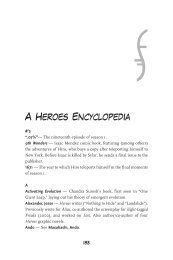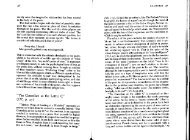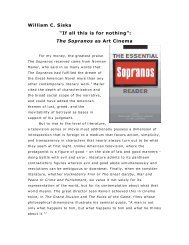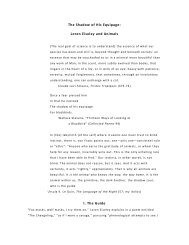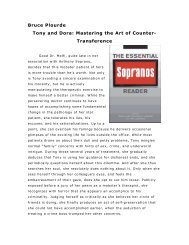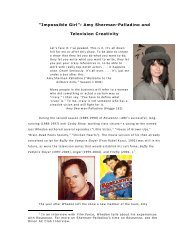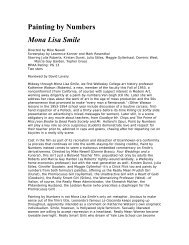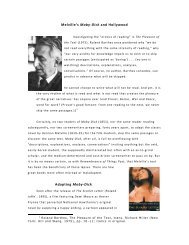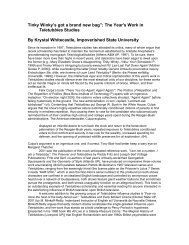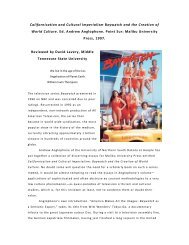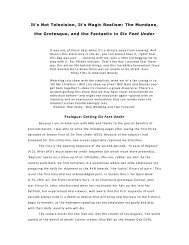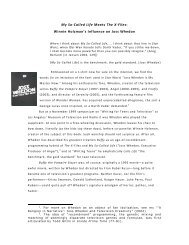The Soul of Andy Sipowicz: Depth of Character and ... - David Lavery
The Soul of Andy Sipowicz: Depth of Character and ... - David Lavery
The Soul of Andy Sipowicz: Depth of Character and ... - David Lavery
You also want an ePaper? Increase the reach of your titles
YUMPU automatically turns print PDFs into web optimized ePapers that Google loves.
<br />
<br />
<strong>The</strong> <strong>Soul</strong> <strong>of</strong> <strong>Andy</strong> <strong>Sipowicz</strong>: <br />
<strong>Depth</strong> <strong>of</strong> <strong>Character</strong> <strong>and</strong> the <strong>Depth</strong> <strong>of</strong> Television <br />
<strong>The</strong> common cognomen <strong>of</strong> this world among the misguided <strong>and</strong> <br />
superstitious is "a vale <strong>of</strong> tears" from which we are to be redeemed by a <br />
certain arbitrary interposition <strong>of</strong> God <strong>and</strong> taken to Heaven—What a little <br />
circumscribed straightened notion! Call the world if you please "<strong>The</strong> vale <br />
<strong>of</strong> <strong>Soul</strong>‐making." <strong>The</strong>n you will find out the use <strong>of</strong> the word (I am <br />
speaking now in the highest terms for human nature admitting it to be <br />
immortal which I will here take for granted for the purpose <strong>of</strong> showing a <br />
thought which struck me concerning it). I say "<strong>Soul</strong>‐making"—<strong>Soul</strong> as <br />
distinguished from an Intelligence—<strong>The</strong>re may be intelligences or sparks <br />
<strong>of</strong> the divinity in millions—but they are not <strong>Soul</strong>s until they acquire <br />
identities, till each one is personally itself. ... How then are <strong>Soul</strong>s to be <br />
made? How then are these sparks which are God to have identity given <br />
to them—so as ever to possess a bliss peculiar to each one’s individual existence? How, <br />
but by the medium <strong>of</strong> a world like this? ... Do you not see how necessary a World <strong>of</strong> <br />
Pains <strong>and</strong> troubles is to school an Intelligence <strong>and</strong> make it a <strong>Soul</strong>? A Place where the <br />
heart must feel <strong>and</strong> suffer in a thous<strong>and</strong> diverse ways! <br />
John Keats, Letter to George <strong>and</strong> Georgiana Keats, 1819 <br />
Earlier this year, in the always‐hilarious Onion, the <br />
weekly “STATshot” listed the most unlikely television <br />
spin‐<strong>of</strong>fs. Number one on their inventory was a potential <br />
show to be called “<strong>Sipowicz</strong>’s Place.” <br />
Although <strong>The</strong> Onion is probably correct that we <br />
should not expect NYPD Blue to spin <strong>of</strong>f its irascible lead <br />
into his own series (as All in the Family once engendered <br />
Archie Bunker’s Place), I for one might drop by <strong>Sipowicz</strong>’s <br />
Place for a drink or two. After eight seasons, <strong>Andy</strong> <strong>and</strong> I <br />
would have much to talk about. <br />
<strong>The</strong> Collected Works <strong>of</strong> <strong>David</strong> <strong>Lavery</strong> 2<br />
An article in Entertainment Weekly in the mid‐’90s made the argument that <br />
television at the end <strong>of</strong> the century may well be better than the movies. <strong>The</strong> <br />
proposition seems at first glance preposterous—how could a medium that had <br />
produced so many masterpieces, so many great auteurs, from Chaplin to Scorsese, be <br />
thought inferior to a rival household appliance? <br />
EW’s case was, nevertheless, compelling: <strong>The</strong> very best series TV—the prime <br />
examples <strong>of</strong> what has come to be called Quality TV—it insisted, <br />
takes more risks, tackles more relevant issues more <br />
provocatively, does more with character, gives women juicier <br />
roles, <strong>and</strong> goes deeper than the movies do, largely because <strong>of</strong> the <br />
generous amount <strong>of</strong> time available, thanks to 22 episodes a year <br />
<strong>and</strong> multi‐year durations. NYPD Blue, for example, had <br />
accumulated by this season’s end approximately 7,040 minutes, <br />
or 117 hours <strong>of</strong> narrative time, in which to become itself—<br />
roughly the equivalent <strong>of</strong> 60 feature films. <br />
But one argument EW did not make—<strong>and</strong> one I am, <strong>of</strong> course, about to—is <br />
that TV may well be the only medium, <strong>and</strong> that includes literature, capable <strong>of</strong> <br />
showing, in something like real time, the making <strong>of</strong> a soul. This world, after all, is, as <br />
Keats sought to remind (<strong>and</strong> contemporary archetypal psychologist James Hillman has <br />
endeavored to show), a "vale <strong>of</strong> soul making." <br />
<strong>The</strong> character <strong>of</strong> <strong>Andy</strong> <strong>Sipowicz</strong> (Dennis Franz) has anchored Steven Bochco <br />
<strong>and</strong> <strong>David</strong> Milch’s NYPD Blue since its inception in 1993. <strong>Sipowicz</strong>’s partners (John <br />
Kelly [<strong>David</strong> Caruso], Bobby Simone [Jimmy Smits—pictured], <strong>and</strong> <br />
Danny Sorenson [Rick Schroeder] have come <strong>and</strong> gone, mostly for <br />
extra‐diegetic reasons. But <strong>Andy</strong>, an alcoholic with a vicious temper <br />
<strong>and</strong> racist tendencies, has returned week after week, struggling to <br />
become a decent human being. <br />
"[<strong>Andy</strong>] <strong>Sipowicz</strong> is one <strong>of</strong> the few people you can smell on TV," <br />
<strong>David</strong> Thompson wrote in Esquire a few years ago, contemplating the <br />
story arc for the NYPD Blue detective played by Franz with a continuing brilliance <br />
that has now won him four Emmys for Outst<strong>and</strong>ing Acting in a Dramatic Series. "From <br />
the outset," Thompson observed, "he was the best portrait <strong>of</strong> unresolved violence <br />
drawn into being a cop <strong>and</strong> the surest prospect for tragedy." <br />
When we first met Detective <strong>Andy</strong> <strong>Sipowicz</strong> in 1993 he was deep into the <br />
bottle, the loosest <strong>of</strong> canons, a simmering racist, hostile not only to his new black
<strong>The</strong> Collected Works <strong>of</strong> <strong>David</strong> <strong>Lavery</strong> 3<br />
boss, Lieutenant Arthur Fancy (James McDaniel), but to his long‐term partner <strong>and</strong> <br />
friend John Kelly <strong>and</strong> virtually everyone around him. He was completely out <strong>of</strong> <br />
control <strong>and</strong> about to be almost‐fatally wounded in a mob hit, payback for his public <br />
humiliation <strong>of</strong> Alfonse Giardello.2 . (A drunken <strong>Sipowicz</strong>, you may remember from the <br />
pilot episode, enters a restaurant where mob goon Giardello is dining, drags him <br />
outside by gunpoint, pushes him down the steps, <strong>and</strong> then stuffs his mouth with, <br />
first, a sock, then his hairpiece.) <br />
“As NYPD Blue began,” Thompson wrote, <strong>Sipowicz</strong> “seemed to be a major <br />
concession to the general wisdom that many cops have wrecked home lives <strong>and</strong> less‐<br />
than‐stable psyches. <strong>The</strong>re was a bigot in <strong>Sipowicz</strong>, a sexist, a genuine brute, filled <br />
with comic pride.” <br />
We knew little then <strong>of</strong> the inner torments that had brought <strong>Andy</strong> to such a <br />
pass, <strong>and</strong> he knew nothing <strong>of</strong> the "World <strong>of</strong> Pains <strong>and</strong> Troubles" he was about to <br />
enter. We did not yet know <strong>of</strong> his troubled relationship with his father (later the <br />
subject <strong>of</strong> a recurring dream), his estrangement from his wife <strong>and</strong> son, his service in <br />
Vietnam <strong>and</strong> his tortured re‐entry, <strong>and</strong> the horrible, faith‐destroying things he had <br />
seen as a New York cop. <br />
And he did not yet know that his no‐longer‐alienated <br />
son would be murdered, that he would be stricken with <br />
prostate cancer, that his new wife would be shot to death by <br />
errant bullets, fired by a grieving father trying to avenge a <br />
daughter’s death. <br />
Nor did we know <strong>of</strong> all the developing traits that <br />
would make <strong>Andy</strong> <strong>Sipowicz</strong> a truly good man. We did not yet <br />
know <strong>of</strong> his visceral hatred for crime, or his obsession with <br />
tropical fish, or <strong>of</strong> his love for Sylvia (Sharon Lawrence) (In <br />
"For Whom the Skell Rolls," Season Two, <strong>Andy</strong> <br />
characteristically talks metaphorically about the things—<br />
previously impossible—he will be able to have when he <strong>and</strong> Sylvia live together in <br />
terms <strong>of</strong> the fish he can now get for his aquarium), or his single‐father love for his <br />
son <strong>The</strong>o. <br />
Because NYPD Blue is a long‐running television series, it has had the time to <br />
show us all this—to show <strong>Andy</strong> <strong>Sipowicz</strong> in all his complexity, in all his <br />
contradictions, acquiring a soul.
<strong>The</strong> Collected Works <strong>of</strong> <strong>David</strong> <strong>Lavery</strong> 4<br />
It has long been a commonplace <strong>of</strong> Marxist <strong>and</strong> neo‐Marxist theory that <br />
cultural texts tend to repress contradiction in order to impose, or at least invite, <br />
ideologically simplistic readings—to, in the words <strong>of</strong> John Fiske, author <strong>of</strong> Television <br />
Culture (Routledge, 1987), "propose a unitary, final ‘truth’ <strong>of</strong> the text work by <br />
resolving contradictions <strong>and</strong> thus deny the force for social change, or at least social <br />
interrogation, that is embedded in them." In the terminology <strong>of</strong> the Russian theorist <br />
Mikhail Bakhtin, cultural texts thus tend toward the monological, not the dialogical. <br />
<strong>The</strong>y tend to speak with one voice rather than many. <br />
Considered as a whole, however, television, as Horace Newcomb <strong>and</strong> Paul M. <br />
Hirsch show in their account <strong>of</strong> TV as a cultural forum (from Television: <strong>The</strong> Critical <br />
View [Oxford UP, 1987]), is anything but monological. And the same might be said <strong>of</strong> <br />
many <strong>of</strong> TV’s discrete units. <br />
any under the authority <strong>of</strong> a single voice. <br />
As Trevor Parry‐Giles <strong>and</strong> Paul Traudt once showed, <br />
thinking <strong>of</strong> another Steven Bochco [pictured] drama, L.A. Law, it <br />
would be misleading to characterize the best television drama—<br />
in a medium still largely authorless <strong>and</strong> with its polyphonic <br />
presentation <strong>of</strong> contradictory views—as either liberal or <br />
conservative (from Television Criticism: Approaches <strong>and</strong> <br />
Applications [Longman’s, 1991]). In the best series TV, a <br />
multiplicity <strong>of</strong> points‐<strong>of</strong>‐view is exhibited without subsuming <br />
NYPD Blue, a show which, largely because <strong>of</strong> its strong language <strong>and</strong> partial <br />
nudity, has inspired perhaps more complaints than any other series on television <br />
from those convinced the media corrupt our public morals, lends itself to a favorable <br />
Bakhtinian reading even more than L.A. Law. And the soul‐making <strong>of</strong> <strong>Andy</strong> <strong>Sipowicz</strong> is <br />
absolutely central to the dialogue the series perpetrates. <br />
Consider race. From the beginning, <strong>Andy</strong> <strong>Sipowicz</strong> has clashed with his black <br />
bos, Lieutenant Fancy. On the street or in <strong>The</strong> Precinct, <strong>Sipowicz</strong>’s racism seems <br />
always about to explode. In the following dialogue from "Oscar, Meyer, Weiner" <br />
(Season One), for example, <strong>Sipowicz</strong> interrogates a young black Ph.D. student whom <br />
the police suspect may be tangentially involved in a vicious murder. <br />
<br />
<strong>Sipowicz</strong>: "Mr. Futrel. Have I been disrespectful to you?" <br />
Futrel: "This is disrespectful. Me being here."
<br />
<strong>The</strong> Collected Works <strong>of</strong> <strong>David</strong> <strong>Lavery</strong> 5<br />
<strong>Sipowicz</strong>: "Hey, pal. I’m trying to find some assholes before they murder <br />
another innocent family. It happens these assholes are black. Now how to <br />
do you want me to put the questions? ‘I’m sorry for the injustices the <br />
white man has inflicted on your race, but can you provide any <br />
information?’ ‘I’m sorry your people have been downtrodden for three <br />
hundred years, but did you discuss the layout <strong>of</strong> the Sloan house with any <br />
<strong>of</strong> your friends?’" <br />
Futrel: "Yeah. Do it that way." <br />
<strong>Sipowicz</strong>: "Okay, I know that great African‐American George Washington <br />
Carver discovered the peanut, but can you provide the names <strong>and</strong> <br />
addresses <strong>of</strong> these friends?" <br />
Futrel: "You’re a racist scumbag." <br />
<strong>Sipowicz</strong>: "Ouch." <br />
Later, in Season Three’s "<strong>The</strong> Blackboard Jungle," <strong>Sipowicz</strong>’ angry colloquy <br />
with a black activist leads to another serious altercation with Lieutenant Fancy <strong>and</strong> <br />
temporary estrangement from his partner, Bobby Simone (Jimmy Smits). <br />
But racism is not innate to <strong>Sipowicz</strong>’s still unfinished character: He battles <br />
with it, without the help <strong>of</strong> AA meetings, just as he battles with his alcoholism. In <br />
the series’ 70th episode, “Where’s Waldo (Season Four), <strong>Sipowicz</strong> <strong>and</strong> Simone must <br />
solve the murder <strong>of</strong> Qwasi, the same black activist who earlier had prompted his <br />
hatred. <strong>Sipowicz</strong> feels called upon to apologize to the ex‐wife <strong>and</strong> young daughter <strong>of</strong> <br />
Qwasi—an apology that only the daughter accepts. <br />
In a subsequent scene, a deeply‐troubled <strong>Andy</strong>, brought to a kind <strong>of</strong> epiphany <br />
by his encounter with the little girl, engages in a racism "talking cure" with his <br />
partner, explaining, but not explaining away, how he came by it. <br />
In Season Six, however, race again became an issue, with <strong>Sipowicz</strong> <strong>and</strong> Fancy <br />
literally coming to blows as the result <strong>of</strong> a disagreement over the latter’s treatment <br />
<strong>of</strong> a cop Fancy had already accused (in a Season Four episode) <strong>of</strong> racism. Racism is <br />
part <strong>of</strong> <strong>Andy</strong> <strong>Sipowicz</strong>’ fabric, an aspect <strong>of</strong> his soul; it cannot be cleanly, simply <br />
removed. NYPD Blue knows that.
<strong>The</strong> Collected Works <strong>of</strong> <strong>David</strong> <strong>Lavery</strong> 6<br />
A documentary record <strong>of</strong> <strong>Andy</strong>’s soul‐making would be as long as NYPD Blue <br />
itself, but the highlight film would surely include certain key scenes: <br />
<br />
<strong>The</strong> scene in Season’s Three’s "Closing Time," in which a battered, <strong>of</strong>f‐<br />
the‐wagon <strong>Andy</strong> begs Bobby Simone for help. <br />
<strong>The</strong> deeply moving scene, in Season Five’s "Lost Israel," where, <br />
inspired by a mute, black, homeless man, <strong>Andy</strong> reads from the Bible in order <br />
to comfort a mother whose son has been abused <strong>and</strong> murdered by his father. <br />
<strong>The</strong> scene in Season Six’s "Safe Home," when his new partner, Danny <br />
Sorenson (Rick Schroeder), comes to seek his help in interrogating Malcolm <br />
Cullinan, the evil millionaire whose perversions unleashed the cycle <strong>of</strong> <br />
violence that led to the death <strong>of</strong> <strong>Andy</strong>’s wife. In a year that saw not only the <br />
end <strong>of</strong> Bobby Simone but the death <strong>of</strong> Sylvia Costas as well—the sort <strong>of</strong> <br />
traumas, which, in the past, had sent <strong>Andy</strong> back to the bottle, but not this <br />
time—<strong>Andy</strong> is ready to respond. <br />
From day one, <strong>Sipowicz</strong> has been a master <strong>of</strong> the interview, able, when <br />
necessary, to break down a perp in interrogation through verbal aggression or <br />
physical violence. But now no violence is necessary, for <strong>Andy</strong> <strong>Sipowicz</strong> has advanced <br />
to a higher plane. As Sorenson <strong>and</strong> <strong>Sipowicz</strong> interrogate Cullinan, <strong>Andy</strong> fixes him with <br />
an icy stare but says almost nothing until he asks Cullinan why he continues to do <br />
evil. Cullinan, says <strong>Andy</strong>, is living some kind <strong>of</strong> "Groundhogs [sic] Day, except in <br />
hell." “Why don't you just cut it out?" asks <strong>Andy</strong>. Cullinan cracks <strong>and</strong> confesses. <br />
It is not just <strong>Andy</strong>’s skills as a detective that have become transcendent. In <br />
the episode just discussed, he is taken by surprise by a partner’s h<strong>and</strong> on his <br />
shoulder, a violation <strong>of</strong> the personal distance he has fought six years to maintain <br />
from all but a few. <br />
But now, seemingly in full possession <strong>of</strong> "a bliss peculiar to" <br />
his own "individual existence," <strong>Andy</strong> <strong>Sipowicz</strong> has become a soul not <br />
only able to forgive, but able to transgress boundaries, capable even <br />
<strong>of</strong> reaching out to comfort the gay precinct administrative assistant, <br />
John Irvin (“Gay John,” as <strong>Andy</strong> calls him) [pictured], who feels <br />
responsible for Sylvia’s death. <br />
In "Safe Home," <strong>Andy</strong> passes the grieving Irwin by without a word, only to <br />
return to the precinct to forgive him. Calling him a hero for taking a bullet, he then <br />
embraces him. "Don't you believe she's [Sylvia] in a better place?" <strong>Andy</strong> asks the
<strong>The</strong> Collected Works <strong>of</strong> <strong>David</strong> <strong>Lavery</strong> 7<br />
very religious Irvin, who cries on his shoulder. This season <strong>Andy</strong> has even allowed <br />
Gay John to baby‐sit his son, though not without some trepidation <strong>and</strong> only after <br />
Danny admonishes him to remember that John is a “homosexual not a child <br />
molester”. <br />
<br />
With the departure <strong>of</strong> Jimmy Smits, many predicted doom for NYPD Blue, <strong>and</strong> though <br />
Rick Schroeder was uniformly praised in his first season’s role as Smit’s replacement, <br />
there were more than a few dissenters in Season Seven (Ken Tucker <strong>of</strong> Entertainment <br />
Weekly being one <strong>of</strong> the most prominent) who felt that the show had begun an <br />
inevitable downhill slide. Though major changes still lie ahead again (old‐timers <br />
Diane Russell <strong>and</strong> Lieutenant Fancy have both departed, <strong>and</strong> <strong>Andy</strong> is due for yet <br />
another partner, as Schroeder just announced his character won’t be returning), it <br />
seems to me, however, that the series is now as solid as ever. <br />
We know from the famous Robert Johnson legend evoked in Brother Where Art <br />
Thou?—“I sold my soul to the devil.” “Why?” “Well I wasn’t using it for nothing”— <br />
that a soul without a purpose can still go to hell. Having shown <strong>Andy</strong> <strong>Sipowicz</strong>’ <br />
acquisition <strong>of</strong> a soul, Bochco <strong>and</strong> company now face an unprecedented challenge: <br />
giving him something to do with it. <br />
In the year (or years) ahead, what <strong>Andy</strong> does with his soul will itself be a <br />
plumb by which to measure not just his own character but the surprising, not‐yet‐<br />
measurable, depth <strong>of</strong> television.




